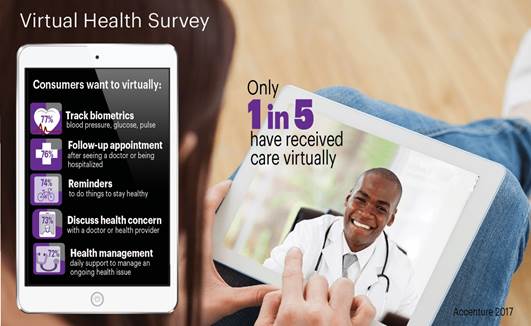
More than three-quarters (78 percent) of consumers say they’d be interested in receiving virtual healthcare services, but only one in five (21 percent) have had the opportunity to receive services in this way, according to a new survey from Accenture. The Accenture survey of 1,501 U.S. consumers reveals that growing consumer demand for virtual healthcare services is putting increasing pressure on providers and payers to expand delivery options for on-demand health services. The research suggests, health systems need to balance and integrate virtual and in-person services with the varying degrees to which consumers see themselves as being in charge of their own health, both today (cited by 85 percent) and if they become ill or injured (51 percent).
For instance, approximately three-quarters of respondents said they would use virtual services: to track health indicators such as blood pressure, pulse and glucose levels (cited by 77 percent of respondents); for follow-up appointments (76 percent); or to be examined for non-urgent health issues such as a rash or a sore throat (70 percent). However, despite the widespread consumer interest, only one in five respondents (21 percent) said they have actually received health services virtually. For those who have received care virtually, the reasons they cited most often for seeking virtual care are: greater convenience than traditional in-person healthcare services (cited by 37 percent); familiarity using technology to manage their health (34 percent); and curiosity to try virtual health (34 percent). Consumers said they would be more likely to “try virtual” if encouraged by a physician (cited by 44 percent of respondents) or a healthcare payer (31 percent).
In addition, the research exposes an untapped opportunity for health systems to expand capacity and lower costs by combining in-person and virtual health services. For example, Accenture estimates that applying virtual health to annual ambulatory patient encounters would save more than $7 billion worth of primary care physicians’ time.
“Consumers are clear: In the 21st century, 20th century healthcare is not good enough,” said Frances Dare, managing director of Accenture’s virtual health services. “Technology-enabled services will be equally important as traditional in-person services, allowing the modern patient to choose when and how they receive health and care services.” “Given evolving consumer attitudes toward virtual care, making virtual health a priority could be a boon for provider organizations that are resource- and finance-constrained,” Dare said. “As more and more patients take control of their own healthcare in the age of consumerism, provider organizations must be able to offer meaningful choices for virtual care, in-person care and a combination of both.”
Survey Background/Methodology
Accenture commissioned a survey of 1,501 U.S. consumers ages 18+ to assess the current use and willingness to receive healthcare services virtually and in-person. The online survey was conducted by Nielsen on behalf of Accenture between Sept. 28 and Oct. 5, 2016. Data were weighted by age, sex, education, race/ethnicity, region, income, household size, Internet use and insurance status.
